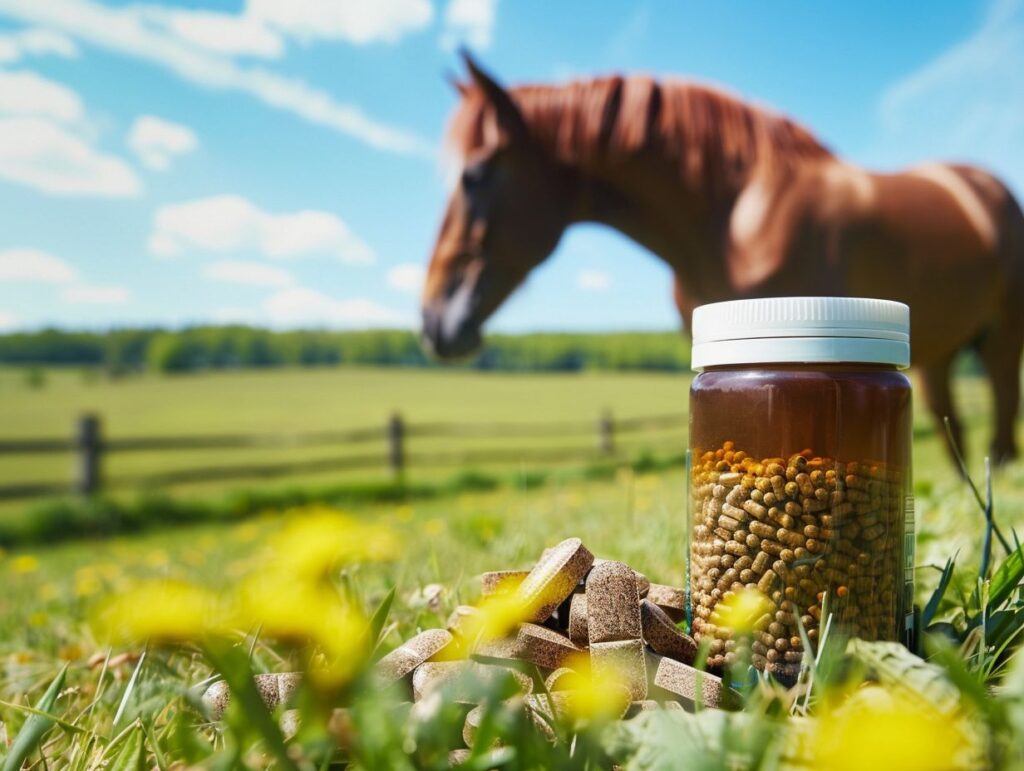Are you seeking to improve your horse’s nutrition but uncertain about the beginning steps? Understanding the essential nutrients for horses and the significance of vitamin and mineral supplements is vital for maintaining the health and strength of your equine partner.
The discussion will cover the reasons horses might require supplements, guidance on selecting the appropriate one, the various types accessible, and recommended methods for administering them. Keep reading to gain insights into potential risks and side effects that warrant attention.
Understanding Horse Nutrition
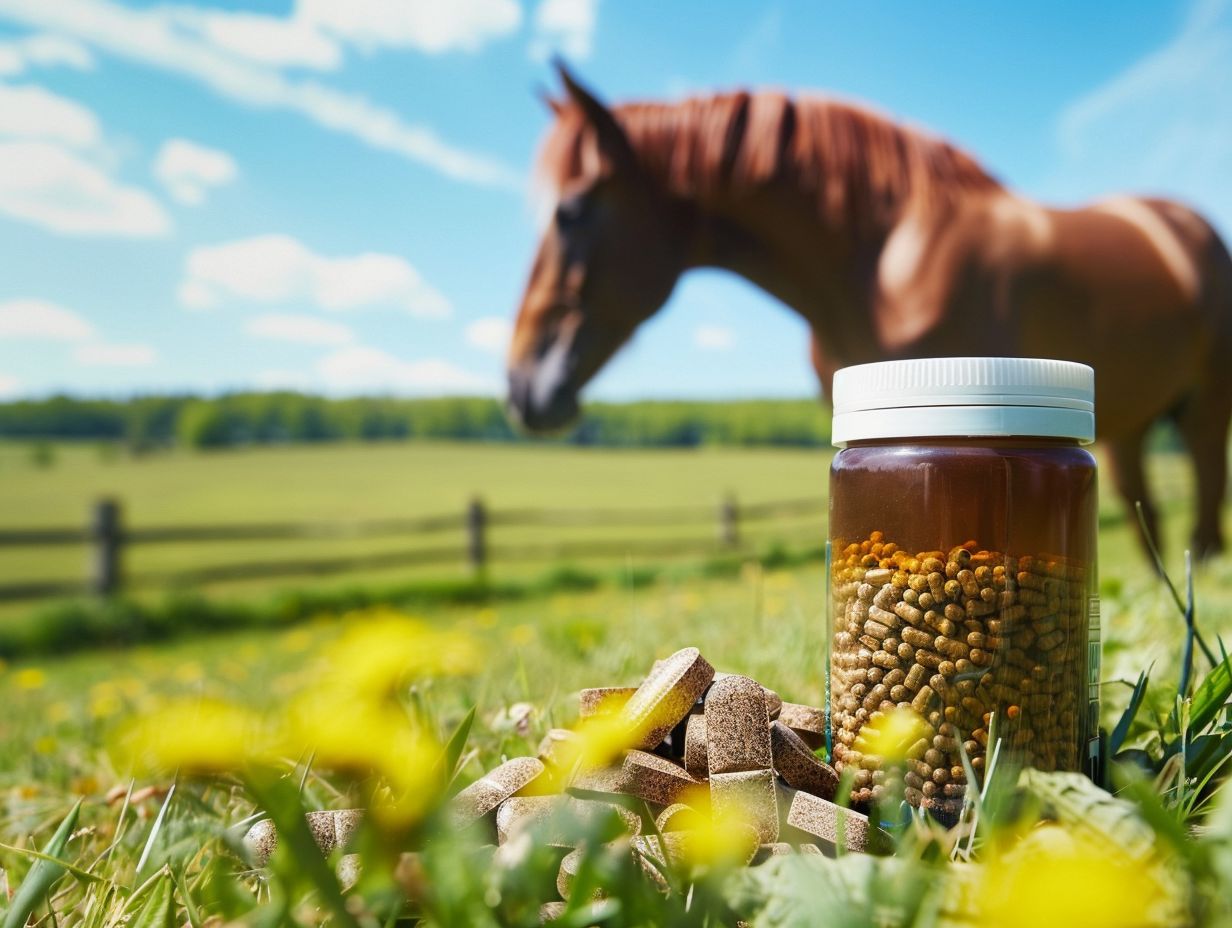
Understanding Horse Nutrition is crucial for maintaining the health and well-being of your equine companion. A balanced dietary regimen that meets the essential nutrient requirements is key to ensuring optimal support of your horse’s overall wellness.
Proper nutrition plays a vital role in not only fueling daily activities but also in maintaining the immune system, muscle development, coat condition, and overall health of your horse. Horses require a variety of nutrients, including proteins, carbohydrates, fats, vitamins, and minerals to function at their best.
It is important to comprehend the specific dietary requirements of horses, as they differ from other animals, and tailor their nutrition accordingly. By providing a well-balanced diet, you can help prevent deficiencies, promote longevity, and enhance the quality of life for your equine companion.
Key Nutrients for Horses
In terms of the key nutrients for horses, a balanced diet rich in essential vitamins and minerals is crucial for their health and well-being. You must ensure that your horse receives optimal nutrient support through supplements for overall health.
Vitamins are essential for various bodily functions in horses. For instance, Vitamin A is important for vision and immune health, Vitamin D aids in calcium absorption, and Vitamin E is crucial for muscle function. Similarly, minerals like calcium, phosphorus, and magnesium are vital for bone health and muscle function. Deficiencies in these nutrients can result in issues such as poor growth, weakened immunity, and decreased performance. Supplements are necessary to fill any gaps in your horse’s diet and provide targeted support to maintain their health and vitality.
The Role of Vitamin and Mineral Supplements
Vitamin and mineral supplements play a crucial role in ensuring the good health and performance of horses. These essential supplements provide the necessary nutrients that may be lacking in their diet, supporting overall health and well-being.
By incorporating vitamin and mineral supplements into your horse’s daily regimen, you can help address any deficiencies that could potentially impact the animal’s well-being. These supplements not only promote strong bones and muscle development but also support the immune system, aiding in faster recovery from injuries or illnesses. Certain vitamins like Vitamin E are known for their antioxidant properties, which can help combat free radicals and reduce the oxidative stress that horses may experience during intense training or competition.
Why Horses May Need Supplements
Horses may require supplements to address nutritional deficiencies in their diet, ensuring they receive the necessary essential vitamins and minerals for optimal health and performance. Factors such as absorption issues or dietary deficiencies may necessitate the use of quality supplements.
Addressing these nutritional gaps with supplements is essential for promoting a well-rounded diet for horses, particularly when forage quality may lack certain nutrients. Through targeted supplementation, horse owners can assist in supporting the animal’s immune system, muscle development, and overall well-being. Supplements play a crucial role in enhancing the horse’s performance, whether in competitive events or daily activities, by ensuring their nutritional requirements are adequately fulfilled.
Choosing the Right Supplement for Your Horse
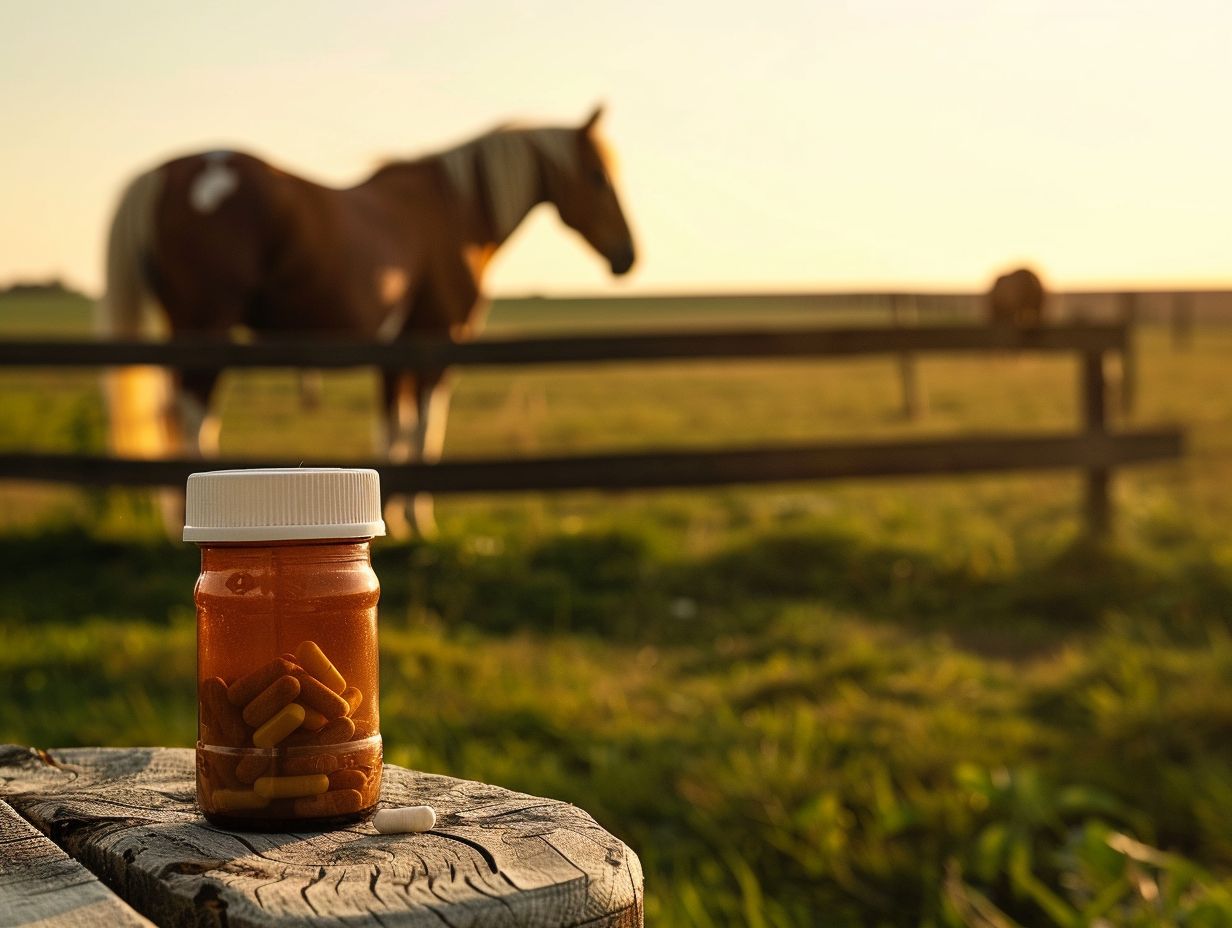
When selecting the right supplement for your horse, it is crucial to prioritize their optimal health and well-being. Opting for a high-quality supplement containing essential ingredients can effectively boost your horse’s nutrition and overall wellness.
It is paramount to select supplements that are specifically designed to address any deficiencies or unique requirements of your horse. Paying attention to optimal dosages is essential to ensure that your horse receives the correct balance of nutrients without the risk of over-supplementation.
By making informed choices in selecting the appropriate supplement, you can support your horse in achieving peak performance, enhanced immune function, improved coat condition, and overall well-being. Regularly evaluating your horse’s diet and seeking guidance from a veterinarian or equine nutritionist can further assist you in making the most suitable supplement choices for their health.
Factors to Consider
When selecting a supplement for your horse, be sure to take into account factors such as the recommended dosage, ingredient quality, and any professional advice from veterinarians. Consider opting for premium quality, organic, or natural formulas to further enhance the care of your horse.
These premium quality supplements are typically crafted with carefully chosen organic or natural ingredients, ensuring a high level of purity and effectiveness. By opting for these formulas, you are demonstrating a commitment to your horse’s well-being and supporting their overall health.
These products are specifically designed to deliver essential nutrients in optimal concentrations, enhancing their efficiency and benefits for your horse’s unique requirements. Veterinary professionals often endorse these premium quality supplements due to their potential positive effects on your horse’s performance, immune system, and overall vitality.
Types of Vitamin and Mineral Supplements for Horses
There are various types of vitamin and mineral supplements available for horses, each designed to provide essential nutrients that support their overall health and well-being. Understanding the different supplement options can help you make an informed choice for your equine companion.
These supplements play a crucial role in ensuring that your horse receives the necessary vitamins and minerals to maintain optimal health. Some supplements focus on specific nutrients like Vitamin E for muscle function and immune support, while others may target joint health with ingredients such as glucosamine and MSM.
It is essential to consult with a veterinarian or equine nutritionist to determine the specific nutritional needs of your horse and select a supplement formula that addresses those requirements. By choosing the right supplement, you can help your horse thrive and perform at its best.
Comparing Pellets, Powders, and Liquids
In terms of administering supplements to horses, you have various options at your disposal, such as pellets, powders, and liquids. Each form presents distinct advantages concerning absorption rates, ingredient quality, and ease of administration, providing you with the opportunity to select the most appropriate option for your horse.
Pellets stand out as a popular choice because of their convenient form and ease of incorporation into feed, ensuring that the horse consumes the complete dosage without any wastage. Conversely, powders offer the advantage of dosage flexibility and are often the preferred choice for selective eaters who may reject pellets. Liquids, although necessitating more precise measurement, prove to be ideal for horses with dental complications or those requiring rapid nutrient absorption.
Administering Supplements to Horses
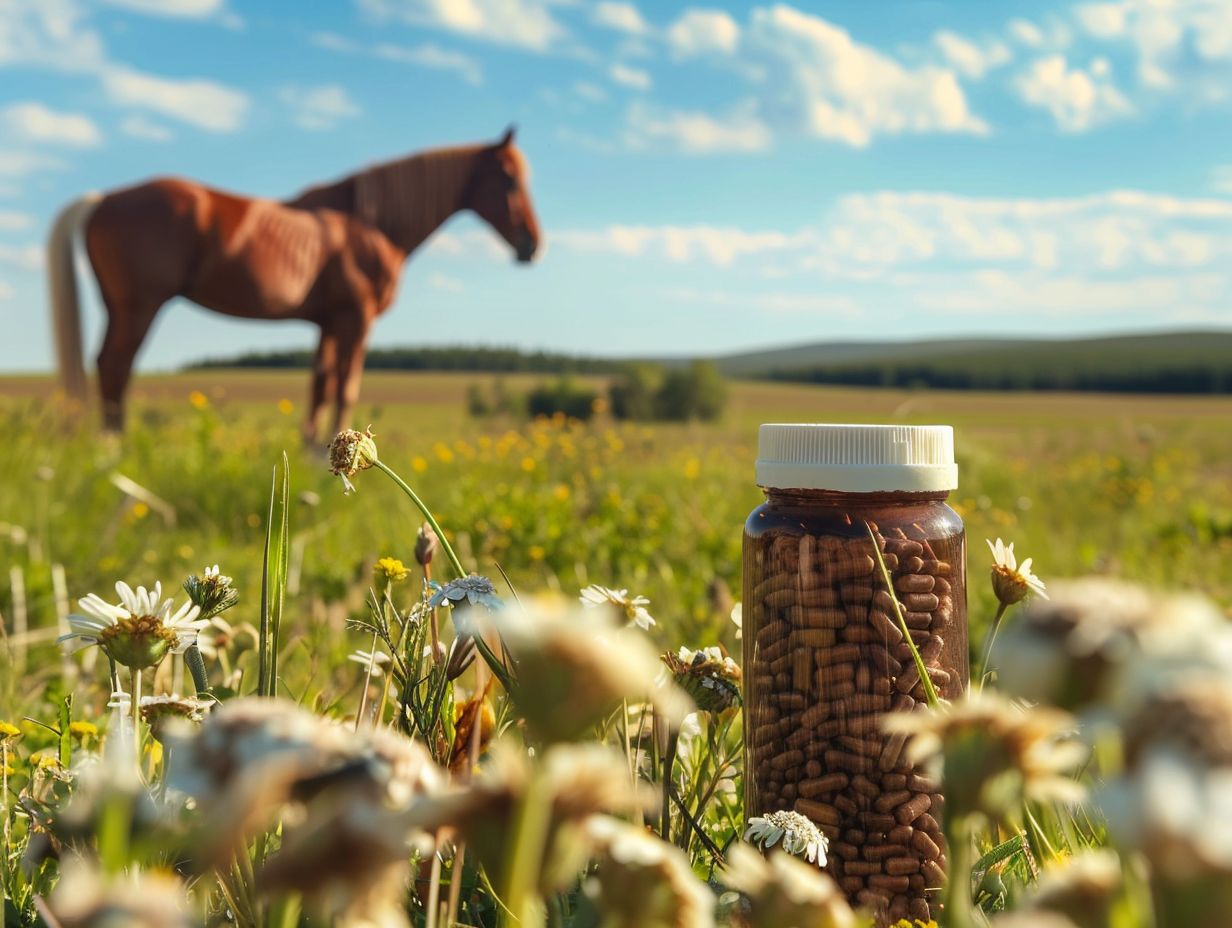
Administering supplements to your horses is an essential component of their nutritional and health management routine. Ensuring the correct dosage, utilizing high-quality ingredients, and proper administration techniques are key to improving your horse’s performance, energy levels, and overall health.
To maintain dosage accuracy, it is imperative that you adhere closely to the manufacturer’s guidelines to prevent either under or over-supplementation. Opting for supplements with top-tier ingredients is critical, as subpar ingredients may prove ineffective or even detrimental to your horse’s well-being. Employing proper administration methods, such as thorough mixing with feed or direct oral administration, can optimize absorption and effectiveness.
By prioritizing these elements, you can assist your horse in achieving and sustaining peak physical condition while bolstering their energy, endurance, and general welfare.
Best Practices for Giving Supplements
In terms of providing supplements to horses, following best practices is crucial for ensuring their optimal health and well-being. Ensuring proper dosage, using high-quality ingredients, and implementing regular maintenance routines can all contribute to enhancements in energy levels, stamina, vitality, as well as overall metabolic and digestive health.
Maintaining the correct dosage is paramount in order to prevent under or over-supplementation, both of which can have negative consequences on the horse’s health. Choosing supplements with quality ingredients is key to ensuring maximum effectiveness. Regular maintenance involves closely monitoring the horse’s response to the supplements and making necessary adjustments. By adhering to these best practices, horse owners can expect improvements in joint health, overall well-being, and performance, ultimately leading to a happier and healthier animal.
Potential Risks and Side Effects
Understanding the potential risks and side effects of supplements is crucial for maintaining your horse’s health. Issues such as nutrient deficiencies, absorption challenges, or adverse reactions can impact your horse’s overall wellness.
Nutrient deficiencies can arise if supplements are not formulated correctly or if your horse’s diet is not adequately balanced. Absorption problems may occur due to interactions between different supplements or with your horse’s existing medication. Adverse reactions, such as allergic responses or digestive issues, are also possibilities.
To safeguard your horse’s health, it is essential to monitor any changes in behavior or physical condition after introducing supplements. Consulting with a veterinarian and following recommended dosage guidelines can help prevent or address these risks effectively.
What to Watch Out for
In terms of supplementing your horse’s diet, you should remain vigilant for any signs of deficiency or potential side effects. Seeking guidance from a veterinarian for professional recommendations is crucial to ensure that your horse’s nutritional needs are adequately met.
Veterinarians possess the expertise to evaluate your horse’s specific requirements and suggest supplements tailored to address any deficiencies or promote overall health. It is important to watch for indicators such as poor coat condition, weight loss, or decreased performance, as these may signify a need for specific nutrients.
Meeting nutrient requirements through supplements can have a positive impact on your horse’s immune system, digestive function, and muscle development. By collaborating closely with a veterinarian, you can navigate the intricacies of equine nutrition and make informed decisions that promote your horse’s well-being.
Frequently Asked Questions
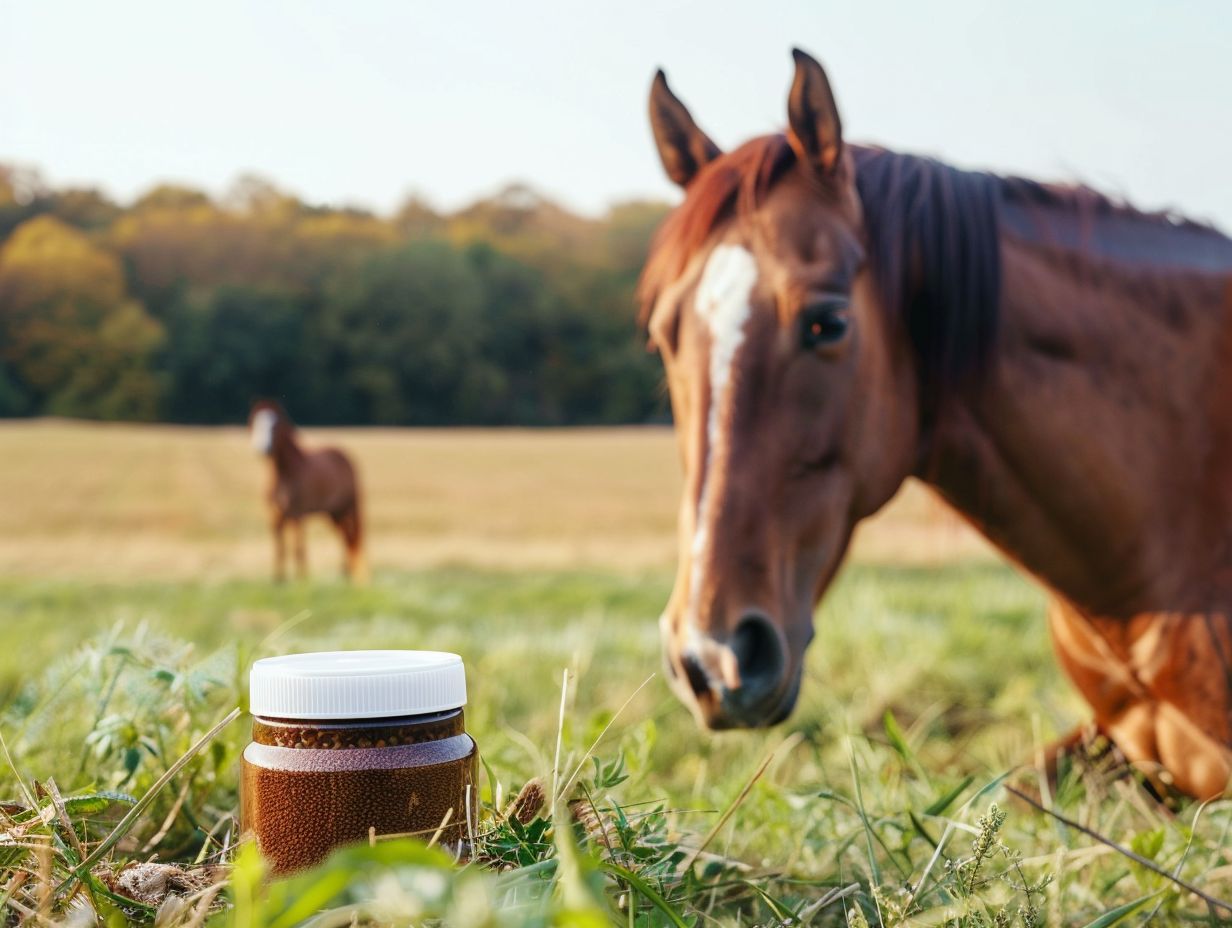
What is a good vitamin and mineral supplement for Horses?
A good vitamin and mineral supplement for horses is one that provides all the essential nutrients needed for their overall health and well-being.
What are the benefits of using a vitamin and mineral supplement for Horses?
Using a vitamin and mineral supplement for horses can provide numerous benefits such as improved immune system, healthier coat and hooves, and better overall performance.
How do I choose the right vitamin and mineral supplement for my Horse?
When choosing a vitamin and mineral supplement for your horse, it’s important to consider their age, activity level, and any specific health concerns they may have. Consult with your veterinarian for recommendations.
Are there any specific vitamins and minerals that are important for Horses?
Yes, there are several vitamins and minerals that are essential for horses, including vitamin A, vitamin E, calcium, and magnesium. These nutrients are important for various bodily functions and deficiencies can lead to health issues.
Can a horse overdose on vitamins and minerals?
Yes, just like with humans, horses can overdose on certain vitamins and minerals if they are given too much. It’s important to follow the recommended dosage and consult with a veterinarian before adding any supplements to your horse’s diet.
Do all horses need vitamin and mineral supplements?
Not necessarily. Horses who have a well-balanced diet and access to quality forage may not need additional vitamin and mineral supplements. It’s best to consult with a veterinarian to determine if your horse could benefit from a supplement.
